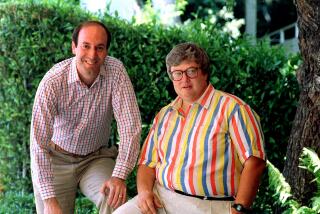Ebert on Ebert
- Share via
Hotly disputing the idea that movie reviewers on TV have lowered standards of film criticism, Roger Ebert insisted that “Siskel & Ebert & the Movies” is “one of the more thoughtful shows on commercial television,” even being “more serious than the other shows.”
He went on: “I think our show is fairly highly regarded. What do you think is better to have on TV--movie criticism or ‘Wheel of Fortune?’ ” he snapped. “I think I try to be as fair and accurate and evocative to what a movie is about as it is possible for me to be.
“We devote more words to a movie than the average newspaper review,” Ebert maintained. “A newspaper review is 600 to 800 words,” he said, arguing that the 4-to-5-minute film reviews aired on the Siskel & Ebert show are longer than those published in newspapers. Moreover, Siskbert reviews also include the showing of film clips, which he likened to “a very effective form of quotation.”
But Ebert, speaking by phone from Chicago, denied that using clips supplied by the studios is free advertising for the movie companies. “It’s not advertising because it’s not paid for by the studio and frequently, of course, we get negative effects,” he said, adding that he and Siskel often make their “own exclusive clips” in a film lab.
“When a newspaper film critic reviews a movie, isn’t that advertisement for the movie?” he countered. “Have you ever noticed that interviews with famous stars appear in newspapers just at the time the movie is coming out? Why do you time it like that? Don’t you just give free publicity when their movie comes out?
“It’s (just) more useful to review a film when it’s in release,” he said.
Ebert scoffed at the notion that he cares about whether he’s quoted in print ads. “Any critic who cares about whether he’s quoted in an ad or not must have a bubble for a brain,” he quipped.
“I use the same language in print that I use on television,” said Ebert, whose reviews are carried in 64 newspapers nationwide.
“Your mistake is to single out TV critics. I don’t think TV critics are any flashier than print critics. Have you looked at a current issue of Time, Newsweek or the L.A. Times?”
More to Read
The complete guide to home viewing
Get Screen Gab for everything about the TV shows and streaming movies everyone’s talking about.
You may occasionally receive promotional content from the Los Angeles Times.






